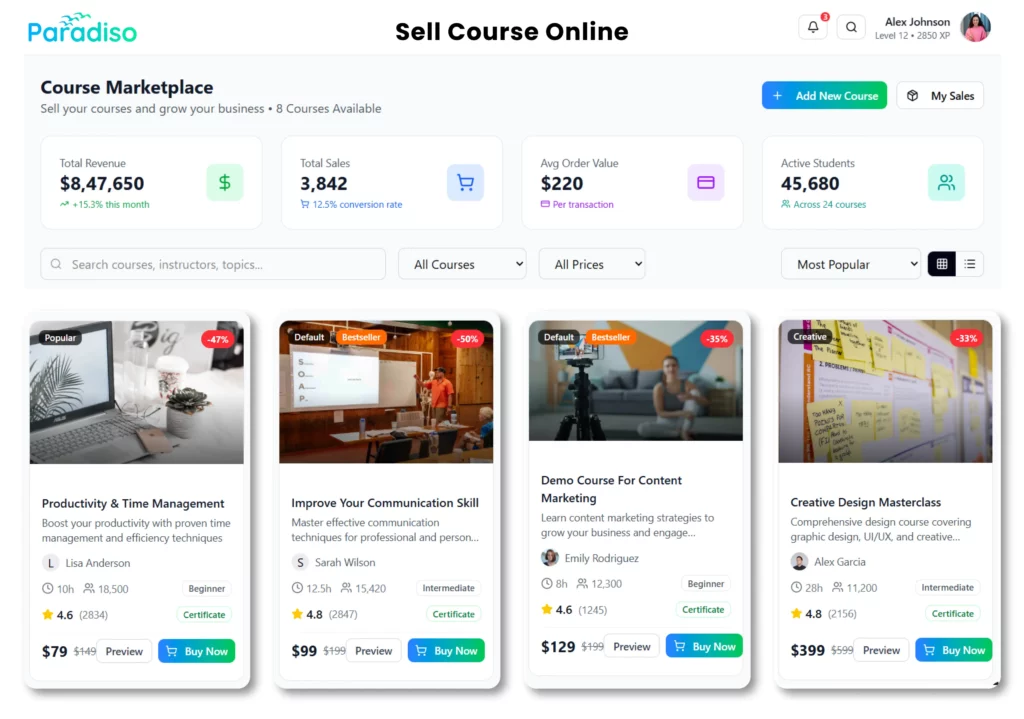Online courses have become increasingly popular for learning and skill development in today’s digital age. If you’re an eLearning expert looking to share your knowledge and expertise with a broader audience, launching your online course is an excellent way. This blog post will guide you through the essential steps to successfully launch your online course and maximize its impact.
Define Your Course Goals and Target Audience:
Before diving into course creation, defining your goals and clearly identifying your target audience is crucial. Ask yourself: What knowledge or skills do you want to impart? Who would benefit the most from your course? Having a specific target audience in mind will help you tailor your content and marketing efforts accordingly.
Plan Your Course Content:
Create a comprehensive course outline that organizes your content into logical modules or lessons. Break down the topics you’ll cover, determine the learning objectives for each module, and plan the delivery methods (e.g., video lectures, quizzes, interactive activities). Ensuring a well-structured and engaging course will significantly enhance the learning experience for your students.
Choose the Right eLearning Platform:
Selecting the right eLearning platform is crucial for the success of your online course. Consider factors such as ease of use, course customization options, marketing tools, payment gateways, and customer support. Popular platforms like Paradiso LMS, Teachable, Thinkific, and Udemy offer user-friendly interfaces and robust features that can simplify the course creation and delivery process.
Create High-Quality Course Content:
Invest time and effort in creating high-quality content that adds value to your student’s learning journey. Use engaging multimedia elements like videos, presentations, audio recordings, and downloadable resources. Ensure your content is well-structured, easy to understand, and visually appealing. Don’t forget to include interactive elements to promote active learning and student engagement.
Set Reasonable Pricing and Promotions:
Determine a fair pricing strategy for your online course. Consider factors like the value it provides, the market demand for similar courses, and your target audience’s budget. You may also want to offer promotional discounts or limited-time offers to generate initial interest and attract new students. Experiment with pricing models like one-time payments, subscriptions, or tiered pricing based on additional course materials or coaching sessions.
Develop a Marketing Plan:
Creating a remarkable course alone isn’t enough; you need a well-defined marketing plan to reach your target audience effectively. Leverage various marketing channels, such as social media platforms, email newsletters, blog posts, and collaborations with influencers or industry experts. Craft compelling course descriptions, highlight the benefits, and use captivating visuals to entice potential students.
Engage with Your Students:
Encourage active participation and foster a sense of community among your students. Offer discussion boards, live Q&A sessions, or private Facebook groups to facilitate interaction and peer-to-peer learning. Respond to student inquiries and provide prompt feedback to enhance their learning experience. Building a positive learning community will increase student satisfaction and encourage referrals.
Gather Feedback and Make Improvements:
Continuously gather feedback from your students to understand their needs and improve your course. Conduct surveys, read reviews, and listen to constructive criticism. Incorporate relevant suggestions and make necessary updates to enhance the course content, delivery methods, or user experience. Regularly updating your course will keep it relevant and appealing to new students.
Conclusion:
Launching your online course can be rewarding and impactful, allowing you to share your expertise and help learners worldwide. By following these steps – defining your goals and target audience, planning your content, choosing the right platform, creating high-quality materials, marketing effectively, engaging with students, and iterating based on feedback – you’ll be well on your way to a successful online course launch. Remember, the key to success lies in providing value, delivering an exceptional learning experience, and continuously improving your course to meet the ever-evolving needs of your students. Good luck with your online course launch!













